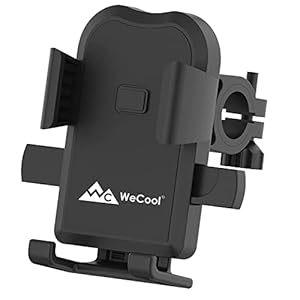
CES 2025 has come to an in depth — Friday was the ultimate day of the present — and staff Engadget has departed Las Vegas. Our reporters and editors spent the week scouring countless carpeted conference halls of the CES show floor, braving strains of chain people who smoke, overcoming nasty colds and sore ankles and fielding hundreds of emails a day to seek out the perfect and most credible merchandise on the present.
It was fairly the problem, because the panorama was dotted with numerous contenders. As anticipated, the overwhelming majority of issues we saw this CES had an AI element, with a noticeable uptick in AR glasses, listening to assist earbuds, solar-powered tech, robot vacuums and even emotional help robots. (Apparently folks actually like robovacs that can pick up socks.) Our staff was inspired to see extra progress in tech constructed to enhance the lives of these with disabilities and mobility points, too.
For all the brand new iterations we noticed on conventional tech like laptops, TVs and soundbars, we noticed a bevy of wonderfully weird off-beat tech on the present, too. And we had been pleasantly shocked to see various of those just-announced CES 2025 products actually available for sale or preorder already.
However there was a small group of recent merchandise that rose above the remainder. Our listing of CES 2025 winners covers a wide range of classes, starting from typical areas like residence leisure, transportation and good residence to theme-based matters like sustainability and accessibility. After our staff shortlisted nominees and voted on the perfect for varied classes, we then carried out one other spherical of voting to resolve on the perfect product of the present.
That mentioned, right here’s the total listing of our picks for the Better of CES 2025.
ASUS Zenbook A14
The ASUS Zenbook A14 feels impossibly mild, weighing between 2.2 and a couple of.4 kilos, and it has a beautiful 14-inch OLED display screen and an honest array of ports (USB-C, USB-A and HDMI)! What else ccould you need in a MacBook Air competitor? After years of mainly copying Apple’s MacBooks, ASUS proves it could out-innovate Apple with out resorting to gimmicks like twin screens or flashy lights. The Zenbook A14 is solely a tiny laptop computer that feels nice in your arms, thanks largely to ASUS’s distinctive Ceraluminum case materials. ASUS claims it could last as long as 32 hours whereas enjoying video, effectively above the 18 hours Apple estimates for the MacBook Air. It might appear odd that the least flashy laptop computer of CES 2025 is considered one of our favorites, however typically pure practicality is simple. — Devindra Hardawar, Senior reporter, critiques
BioLite Backup
We’re all the time in search of model new, never-seen-before stuff at CES, however typically it’s the intelligent reinterpretation of present tech that catches our consideration. That’s the case with Backup by Biolite. It’s basically a cross between a common energy provide (UPS) and a whole-home backup battery, however improves on each.
The skinny, 40-pound 1.5 kWh battery lives between a wall outlet and your fridge (or some other plug-in machine) and retains these issues working within the occasion of an influence outage. It doesn’t require skilled set up, only a user-installed wall mount, and it’s skinny sufficient to cover behind your fridge or tuck below a counter. Although if it had been on show, the matte-silver end wouldn’t spoil any aesthetic.
The Backup Complete contains two items that offer as much as 3 kWh, which is sufficient to energy a fridge, microwave, lights, in addition to refill telephones and a laptop computer. The three kWh capability and the truth that it’s an put in battery presently qualifies it for a 30 % federal tax credit score, which might deliver the fee all the way down to $2,100 for the Full. The only-unit Backup Core packs 1.5 kWh and goes for $2,000. Each can be found for pre-order now and may ship this summer time. — Amy Skorheim, Reporter, shopping for recommendation
Jackery Photo voltaic Roof
Jackery is already a longtime title in home photo voltaic generator methods, and its newest product fills a wavy hole in its product lineup. Jackery’s XBC curved solar roof shingles mimic a number of the most typical home types within the nation, and so they are available terracotta or obsidian colorways for optimum HOA appeasement. These are the primary curved photo voltaic tiles to hit the US market and so they ship a cell conversion effectivity of greater than 25 %. They will face up to excessive climate situations, together with temperatures between -40 levels F and 185 levels F, and so they’re designed consistent with conventional roofing set up practices, that includes a modular setup that permits for versatile upkeep. Jackery’s new wavy photo voltaic tiles join with the corporate’s present photo voltaic technology and storage merchandise, making them an accessible and enticing choice for whole-home sustainability. — Jessica Conditt, Senior reporter
Lenovo Legion Go S
The plight of the fashionable handheld-PC gamer is attempting to resolve which OS to make use of. There are a ton of Windows 11-based gadgets that supply unparalleled compatibility and robust graphics help. However all that comes on a platform that isn’t optimized for smaller devices with connected controllers. Alternatively, SteamOS provides a way more cohesive expertise with a greater UI and fewer efficiency overhead. The issue is that Valve’s working system was mainly solely accessible on a single machine — the Steam Deck. That modifications now with the Lenovo Legion Go S, which will probably be accessible in two flavors: a Home windows model and for the primary time on any handheld not made by Valve, a mannequin powered by SteamOS.
Except for the selection of platforms and completely different coloured shells, we admire that the 2 variants characteristic nearly similar specs together with an AMD Ryzen Z2 Go processor, as much as 32GB of RAM, 1TB of storage and a decently giant 55.5Whr battery. Its 8-inch touchscreen seems nice too, because it provides a 120Hz refresh charge with help for VRR, 500 nits of brightness and a 1,920 x 1,200 decision. And with costs beginning at $600 (or $500 for the SteamOS mannequin), it’s fairly inexpensive too. Maybe the most important draw back is that whereas the Home windows mannequin will probably be out later this month, we’re going to have to attend till Might for the one powered by SteamOS. However with the latter kind of lastly making good on the practically decade-old promise of Valve’s Steam Machines, holding out for a couple of further months doesn’t appear so lengthy. — Sam Rutherford, Senior reporter, critiques
LG OLED evo M5
LG’s Better of CES crown is secure for one more 12 months. The corporate is constantly on the prime of the perfect TVs we see annually in Las Vegas, and it continuously comes out the winner. For this 12 months’s OLED evo M5, the corporate managed to additional enhance its most premium shows, including the most recent α (Alpha) 11 AI processor Gen2 to enhance the look of lower-resolution content material and energy superior options.
For players, there’s a 165Hz refresh charge, alongside each NVIDIA G-SYNC and AMD FreeSync Premium certifications. This could easy issues out and preserve lag to a minimal. The corporate’s new Brightness Booster Final can obtain ranges which might be 3 times brighter than “standard OLED” fashions, in accordance with the corporate. Plus, the characteristic contributes to a UL Options’ “Excellent Black” and “Excellent Shade” verification on the M5. It’s actually gorgeous image high quality.
Lastly, LG’s Zero Join Field that’s been accessible on the M-series for some time now could be lastly accessible on screens under 77 inches. This machine means that you can join all your consoles and streaming gear with out working a number of HDMI cables to the TV. LG now says it doesn’t want line-of-sight clearance both, and that it may be hidden in a picket cupboard close to the M5. — Billy Steele, Senior reporter, critiques
Moonbird Moonbuddy
Devices made for leisure shouldn’t be difficult. Moonbuddy has one function — to make guided breathwork accessible and interesting to youngsters — and it nails the execution with no pointless frills. The corporate behind it first made the same stress aid machine for adults, and Moonbuddy simplifies that have and places it right into a cuter bundle. Moonbuddy is an egg-shaped machine with a delicate space that expands and contracts in set rhythms, so children can comply with alongside and sync up their very own respiration. It matches into an animal themed sleeve, so it seems like a toy. There are 4 completely different respiration modes, every lasting a couple of minutes and designed to advertise a state of calmness.
The entire thing is tactile and screen-free, which is particularly good contemplating many dad and mom might need to incorporate it into the nighttime routine. And as a lot as I like the little animal outfits as an individual who gravitates towards cute issues, I additionally like that in case your child will get to that stage the place they reject all the pieces babyish, they will take the sleeve off and preserve utilizing it in its extra nondescript kind. — Cheyenne MacDonald, Weekend editor
OhSnap MCON
The MCON by OhSnap mainly transforms any smartphone into a contemporary Xperia Play, full with fashionable conveniences like Corridor impact analog sticks, silent buttons, flip-out grips, and a full bumper and set off format. It’s a cellular gamepad that may slide into your pocket with out the sticks or handles getting caught on something, and it really works with just about each smartphone available on the market in the present day. The MCON makes use of MagSafe to snap onto the again of any current iPhone and it comes with an adapter for Android gadgets to hitch in on the enjoyable. It even works with the Galaxy Z Fold, and its creator, Josh King, is engaged on an answer for the Z Flip, too.
The mockup that King dropped at CES 2025 felt light-weight but strong and cozy to carry, and the phone-snapping motion was supremely satisfying. After gaining a little bit of viral fame along with his concept, King partnered with established MagSafe accent producer OhSnap to push the MCON into full manufacturing, and it’s resulting from hit the market in August for $150. — Jessica Conditt, Senior reporter
Roborock Saros Z70
Robotic vacuums acquired a bunch of recent — and typically unusual — powers at CES 2025. However none made an even bigger impression than Roborock’s Saros Z70, which comes with a mechanical arm that may choose up socks, elevate cords and seize different objects.
The OmniGrip arm can choose up objects as much as 300 grams (slightly greater than half a pound) as a way to clear below them or deposit them within the location of your selection. Performance of the arm is managed by way of Roborock’s app and is extraordinarily customizable so you’ll be able to program it to select up free trash and cat toys, however elevate up cords to wash beneath.
After we noticed it in motion at CES, it deftly picked up socks and positioned them in a basket. However Roborock guarantees it could do far more. The vacuum will robotically acknowledge 108 completely different objects — sure, like seemingly each different gadget we noticed at CES, it makes use of AI — however you may as well educate it to detect as much as 50 further gadgets so it is going to know the way to deal with obstacles it’s almost certainly to come across in your house.
Surprisingly, the Saros Z70 wasn’t the only robotic vacuum with an arm we noticed at CES, however will probably be the primary which you can truly purchase. — Karissa Bell, Senior reporter
Technics EAH-AZ100 earbuds
Technics’ new Magnetic Fluid drivers have garnered lots of headlines this week, however all you really want to learn about the EAH-AZ100 earbuds is that the sound high quality is massively improved. Powered by these new elements, there’s extra readability, element and bass, all of that are upgrades from the already spectacular AZ80. Technics revised its earbud form for the AZ100 within the title of consolation and match, whereas additionally making the buds smaller and lighter. Options like contact controls, multipoint connectivity for 3 gadgets, spatial Dolby Atmos audio and LDAC help are right here as effectively. And in contrast to most of what we see at CES, these new earbuds are already accessible to buy. — Billy Steele, Senior reporter, critiques
Urtopia Titanium Zero
For the reason that pandemic, e-bikes, not electric cars, have been on the forefront of the EV revolution, and it’s simple to see why: Electrical bikes are much more inexpensive than their four-wheeled counterparts. Plus, right here at Engadget, we’re all for gadgets that promote more healthy dwelling, and for a lot of, getting an e-bike will be transformational.
So when Urtopia confirmed up at CES 2025 with an idea e-bike that includes a novel motor design, I used to be excited. As my colleague Daniel Cooper notes in his writeup, e-bike motors have historically are available two kind elements, every with their very own set of issues. The custom-designed Quark DMI.2 mid-drive motor Urtopia confirmed off alongside its Titanium Zero e-bike provides a 3rd path. It’s not as highly effective as conventional mid-drive motors, nevertheless it nonetheless options extra energy output than even the perfect hub motors. Better of all, the motor is sufficiently small to suit inside a backside bracket and weighs simply 2.6 kilos.
Urtopia hasn’t mentioned when it is going to begin manufacturing the Titanium Zero, nevertheless it’s simple to see a situation the place the design of the Quark DMI.2 evokes different bike makers and pushes the business ahead. — Igor Bonifacic, Senior reporter
WeWalk Sensible Cane 2
Of all of the merchandise at CES 2025 that had AI stuffed into them, WeWalk’s Smart Cane 2 stood out. The good cane for folks with visible impairments acquired an replace this 12 months that not solely provides AI, but in addition addresses the unique’s shortcomings. It brings extra superior sensors, and better of all, nonetheless works as a traditional folding cane when these technological options aren’t engaged. The Sensible Cane 2 can detect obstacles and supply turn-by-turn navigation, and it has a ChatGPT-powered assistant that may present solutions to questions whereas somebody is strolling, with out the necessity to attain for a smartphone. WeWalk additionally refined the precise cane by making its deal with slimmer, changing the unique’s touchpad with tactile buttons and shaving a little bit of weight off.
Positive, you won’t be capable to belief ChatGPT to offer you appropriate solutions to each query conceivable but, however at the very least on this implementation, the product isn’t prone to hurt customers even when the AI fails. Plus, it has helpful {hardware}, together with time-of-flight and movement sensors to enhance navigation, audio system to supply solutions and suggestions, in addition to a flashlight to make the visually impaired extra noticeable at evening. And once more, if the battery dies, you’ll be able to nonetheless use this as a conventional, albeit pricier, cane. — Cherlynn Low, Deputy editor, critiques
Yukai Engineering Mirumi
Probably the most memorable robots at CES this 12 months was the one which arguably does the least. We discovered ourselves powerless towards the heart-melting charm of Mirumi, a tiny, fluffy robotic made by Yukai Engineering that actually simply stares at folks and appears round like a child discovering the surface world. It’s sufficiently small to slot in the palm of your hand, however even higher than that, it has lengthy posable arms that enable it to hold onto objects. So in case you put it in your bag strap, it is going to stare down everybody you encounter, and perhaps turn out to be slightly shy once they return the eye.
Mirumi has no function apart from to unfold pleasure, and I adore it for that. Yukai beforehand introduced us the bizarre Qoobo pillow (the one with the tail) and the cat that nibbles your finger, and that is one other case wherein it didn’t miss with considered one of its odd creations. — Cheyenne MacDonald, Weekend editor
Greatest in present: WeWalk Sensible Cane 2
At CES this 12 months, AI was unsurprisingly in every single place, typically in locations it didn’t actually appear to be it wanted to be. However the WeWalk Sensible Cane 2, a high-tech model of the mobility cane for people who find themselves blind, struck me as an software the place it might truly be actually useful. With a brand new voice assistant that’s powered by GPT, customers can communicate on to the cane to get detailed navigation steering and on-demand data, like public transportation choices and menu gadgets. The good cane can also be full of sensors that enable it to alert the customers of upcoming obstacles. It does this with haptic suggestions within the deal with and by calling out a verbal warning.
WeWalk co-founder Kursat Ceylan, who’s blind, gave an indication of the cane within the chaotic atmosphere of the Las Vegas Conference Middle, and it was spectacular. The voice assistant responded rapidly and precisely to his prompts, and the impediment detection alert was loud sufficient to be heard over the excitement of the CES crowd. It might probably additionally pair with headphones or earbuds by way of Bluetooth. For the reason that cane can deal with issues like turn-by-turn navigation, customers don’t have to fret about additionally holding a smartphone whereas they’re attempting to get round.
The good cane takes an present instrument that persons are already aware of and enhances it. Importantly, it additionally looks as if the corporate heard the suggestions of customers who had the primary model of the cane and improved the design to raised meet their wants. It has a slimmer deal with than the primary mannequin and tactile buttons, and weighs about the identical as a conventional white cane. — Cheyenne MacDonald, Weekend editor
Trending Merchandise



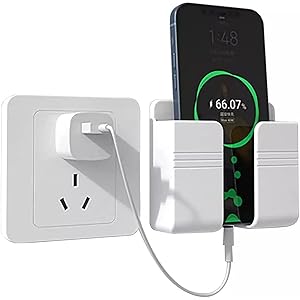
![CRATIX 360°Rotatable and Retractable Car Phone Holder, Rearview Mirror Phone Holder [Upgraded] Universal Phone Mount for Car Adjustable Rear View Mirror Car Mount for All Smartphones](https://m.media-amazon.com/images/I/410N7NZtIjL._SS300_.jpg)
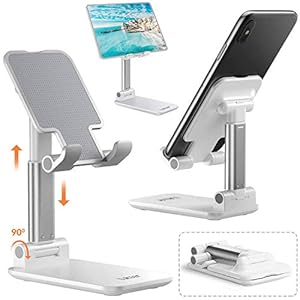
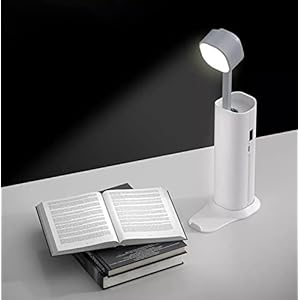


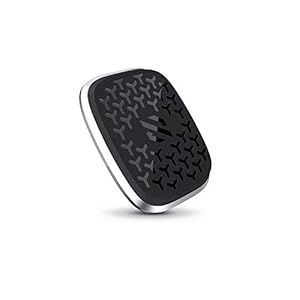
![Car Phone Holder Mount, [Military-Grade Suction & Super Sturdy Base] Universal Phone Mount for Car Dashboard Windshield Air Vent Hands Free Car Phone Mount for iPhone Android All Smartphones](https://m.media-amazon.com/images/I/51KK2oa9LDL._SS300_.jpg)
